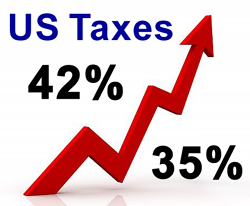Investor’s Business Daily | by Thomas Sowell | Jan. 8, 2010
Most intellectuals outside the field of economics show remarkably little interest in learning even the basic fundamentals of economics. Yet they do not hesitate to make sweeping pronouncements about the economy in general, businesses in particular, and the many issues revolving around what is called “income distribution.”
Famed novelist John Steinbeck, for example, commented on the many American fortunes which have been donated to philanthropic causes by saying:
One has only to remember some of the wolfish financiers who spent two thirds of their lives clawing a fortune out of the guts of society and the latter third pushing it back.

 It may come as a surprise that US companies pay the highest taxes in the world. Yes, you read that right! American businesses, large and small and across all industries pay from 35% to 41.6% of their income in combined state and federal taxes. The 41.6% maximum rate is scheduled to rise to 46.2% in 2010 when President Obama’s promised tax increases are implemented. Compare that to socialist France where companies pay only 34.4% in taxes, to China where the rate is 25%, or Russia which levies a mere 24%. Corporations in Ireland, Europe’s fastest growing economy for the last 18 years, pay just 12.5% in taxes.
It may come as a surprise that US companies pay the highest taxes in the world. Yes, you read that right! American businesses, large and small and across all industries pay from 35% to 41.6% of their income in combined state and federal taxes. The 41.6% maximum rate is scheduled to rise to 46.2% in 2010 when President Obama’s promised tax increases are implemented. Compare that to socialist France where companies pay only 34.4% in taxes, to China where the rate is 25%, or Russia which levies a mere 24%. Corporations in Ireland, Europe’s fastest growing economy for the last 18 years, pay just 12.5% in taxes.